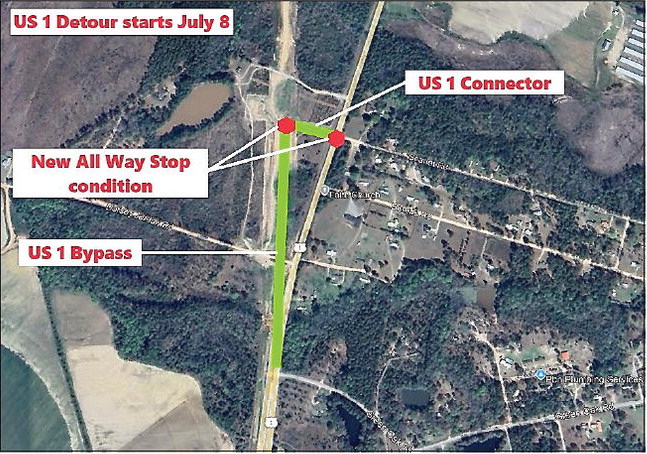One-Time State Payout Pays Off for Area Communities


But Tillery Says of State Finances: Ride May Be About to Get Bumpy
dclarkadvance@ gmail. com
Cities and counties across Georgia got a boost recently as the state doled out over $240 million in misdirected sales taxes to local governments. It may have been great news for municipalities, but the payout was a substantial blow to state finances at a time when revenue is showing signs of slowing down. Earlier this year, the state Department of Revenue’s random audits of previous tax payments alerted state officials of a discrepancy in the division of sales taxes between state and local governments in a prior year. Further investigation indicated a computer software error dating back to at least 2015. A software/coding change in 2017 eliminated the problem, but the discrepancy in distribution was not discovered until recently. Once the state was aware of the issue, the funds were distributed.
The one-time payout resulted in hundreds of thousands of dollars going into the coffers of local governments in this area.
“It’s something we weren’t expecting, but it could not have come at a better time,” said City of Vidalia Finance Director Bill Bedingfield. “It’s been a tough time. Taxes are slower coming in and people are struggling to pay their water bills. That impacts our revenue.” The City of Vidalia received over $413,500 in its Local Option Sales Tax allocation in September. Normally, the City’s LOST funds average about $185,000 per month. The City’s Special Purpose Local Option Sales Tax allocation was over $391,000. The average monthly allocation is $160,000.
“I don’t look at it as a windfall. What we are getting was what was due us over the last three to four years. That should have been money coming to us since 2015. I would think that it could have gone back even further (than 2015),” Bedingfi eld said.
“The funds showed up in everybody’s accounts at the end of September. Every sales tax is impacted by this,” said John Jones, Toombs County Manager. Jones said the County’s $943,203 SPLOST allocation was divided between the County and the cities of Vidalia, Lyons and Santa Claus. Population determines the percentage of funds each government receives. For the same time period in 2019, the County received $412,890 in SPLOST funds.
The County’s T-SPLOST allocation, which funds transportation and roads, specifically, was $58,844. Normally, this allocation is $28,000 per month. T-SPLOST funds go directly to local governments individually as separate allocations.
The Vidalia School Board got an extra $270,000 through its E-SPLOST allocation, said Superintendent Garrett Wilcox. Normally, this allotment averages about $187,000 per month. Vidalia BOE and Toombs County BOE share an E-SPLOST allocation with Vidalia receiving a 48% share based on population. Toombs County, which receives 51% of the SPLOST funds, got an extra $490,000 said Superintendent Barry Waller. Normally, Toombs brings in an average of $220,000 through E-SPLOST.
Montgomery County Manager Brandon Braddy said the average amount pulled in through SPLOST is about $63,000 monthly. In September, the County received a $76,800 SPLOST allotment, which will be divided between the County and the municipalities of Ailey, Alston, Mt. Vernon, Tarrytown, Uvalda and Higgston.
In Wheeler County, an allotment of $34,081.20 went into the SPLOST account, and will be divided between the County and the cities of Glenwood and Alamo. The difference between what the County averages throughout the year and the amount continued from page
of the one-time payout was $2,219.22, said Elaine Wright, County Clerk. The LOST allocation for the same time period was $19,766.73, an increase of $1,287.02 above what the County normally generates.
Because of the payout, for the first time in FY 2021, Georgia’s monthly revenues dipped below the FY 2020 comparison. “The one-time sales tax payout set the state back $81.3 million for the month of September compared to last year. Absent the one-time payout, September numbers would have reported as roughly $159 million to the positive,” Sen. Blake Tillery, R-19, Vidalia, said in his Sensights newsletter. Tillery, Chairman of the Senate Appropriations Committee and Sen. Chuck Hufstetler, R-52, Rome, author the monthly roundup of various economic indicators impacting the state.
Tillery said state revenue numbers still held strong through September despite the payout. “The slowdown is now becoming apparent, however. Federal dollars which by some calculations make up 25% of all spending have slowed. Housing starts are slowing, personal income is slightly falling, and the Fed seems committed to growing inflation at 2% instead of the 1% or less we’ve been experiencing.” These factors will likely mean state revenues will soon slow and dip below FY 2020 numbers. “We will have to hang on through the spring to make this year’s budget work. The ride may be about to get more bumpy.” In explaining how the misdirection of sale taxes occurred, Tillery noted that both state and local sales taxes are paid by various businesses to the State Department of Revenue, (DOR) which then divides the applicable taxes for distribution to the state treasury and to local communities/ school systems. Earlier this year, DOR’s random audits of previous tax payments alerted state officials of a discrepancy in the division of sales tax between state and local governments in a prior year. This triggered a deeper investigation, which revealed certain sales tax software used an incorrect formula when reporting sales tax from individual stores to DOR, Tillery’s newsletter said. The deeper investigation revealed that all stores using this software had the same error beginning in 2015, and the error was corrected by a software update in 2017.
While the error was too small to trigger an earlier alert, its conglomerate total was actually quite large—approximately $240 million. The state opted to redirect the funds to local governments in one lump sum, thus the upswing in SPLOST and LOST funds in communities throughout the state and, correspondingly, the dip in state net sales tax collections for September.





